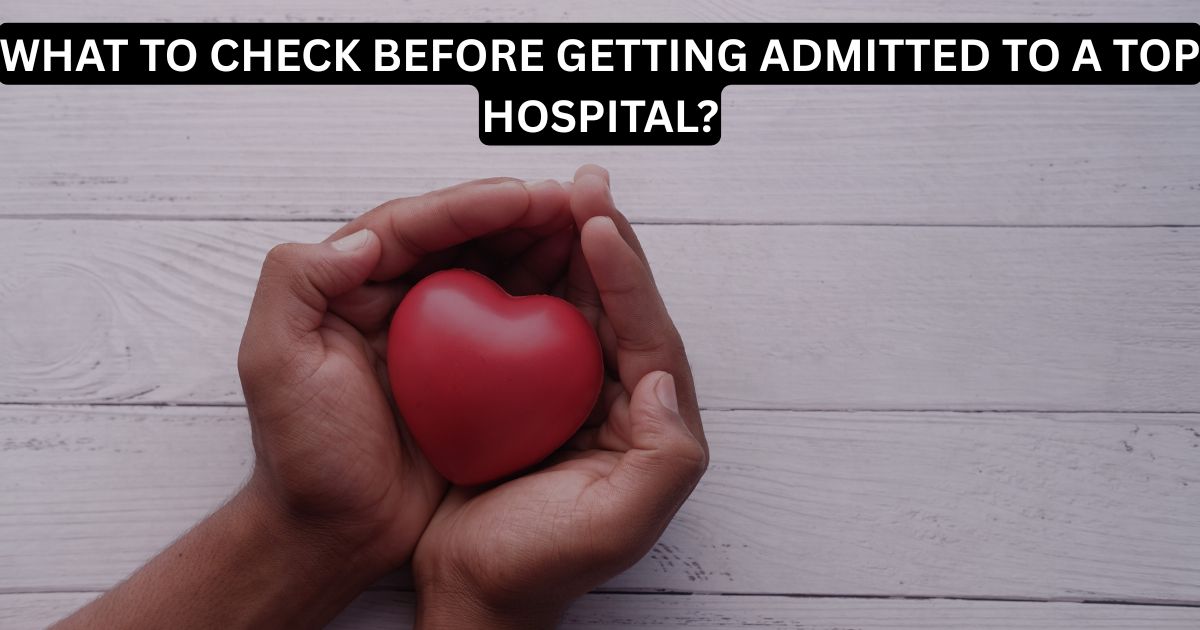What to Check Before Getting Admitted to a Top Hospital – When you or your loved one needs hospital care — whether it’s for planned surgery, critical treatment, or an unexpected emergency — the stakes feel sky-high. Choosing a top hospital can provide peace of mind. But just picking the biggest name isn’t enough.
Even the best hospital can’t guarantee a perfect experience if you don’t check the right details in advance. Your comfort, safety, costs, and recovery can all be impacted by what you do before you get admitted.
So, what should you check before getting admitted to a top hospital?
In this comprehensive 2025 guide, you’ll learn:
- The key questions to ask your doctor and hospital staff
- How to verify a hospital’s quality and safety record
- What to check in your admission papers
- Insurance coverage tips to avoid surprise bills
- Patient rights and how to advocate for yourself
Use this practical checklist to protect your health, your wallet, and your peace of mind — so you can focus on healing, not hassles.
Confirm the Hospital’s Accreditation and Reputation
Even world-famous hospitals can vary by department and specialty.
- Check Accreditation:
Is the hospital accredited by your country’s top health quality body? In India, that’s NABH (National Accreditation Board for Hospitals). In the US, look for Joint Commission accreditation. In the UK, it’s the Care Quality Commission (CQC).
Accreditation means the hospital meets strict standards for hygiene, infection control, patient safety, and quality of care.
- Review Quality Ratings:
Search for up-to-date reviews and safety ratings for your hospital and specific department. Websites like Care Quality Commission (UK) or Centers for Medicare & Medicaid Services Hospital Compare (US) are great places to start. - Ask Around:
Talk to patients or families who were recently treated there. Did they feel cared for? Was the staff responsive?
Research the Doctor or Surgeon Treating You
A hospital is only as good as its team. If you’re going in for surgery or specialist care, check:
- Doctor’s Credentials:
Are they board-certified? Do they have experience with your condition or procedure? How many similar cases do they handle each year? - Infection & Complication Rates:
For surgeries, ask about the surgeon’s success rates, complications, and recovery stats. - Communication Style:
Did you feel heard during your consultation? A good doctor explains the risks, benefits, and alternatives clearly.
Understand Your Diagnosis & Treatment Plan
Before admission, you should clearly understand:
- Your confirmed diagnosis
- Why hospital admission is needed
- What treatment or surgery will be done
- Possible risks and complications
- Alternatives, including non-surgical options
Ask for a written treatment plan, and don’t be afraid to get a second opinion if you’re unsure.
Know Which Services Are Included
Many patients face surprise costs because they assume everything is covered.
Room Type:
Is it a general ward, semi-private, or private?
What is the daily charge?
Does it include nursing care and meals?
Tests and Procedures:
Are pre-surgery tests included in your package?
Consumables & Medications:
Some hospitals add high mark-ups for disposables and branded medicines. Ask if you can get generic alternatives or bring your own if allowed.
Double-Check Insurance Coverage & Pre-Auth
If you have health insurance, talk to both the hospital’s billing team and your insurer before admission:
Network Hospital:
Is the hospital “in-network” for cashless claims?
If not, what’s the process for reimbursement?
Pre-Authorization:
Most insurers require pre-authorization for planned surgeries. Get all paperwork done in advance.
Coverage Limits:
Check your sum insured limit, room rent cap, exclusions (e.g., some cosmetic surgeries are not covered), and co-payment clauses.
Ask for Cost Estimates:
Get a written cost estimate for the entire treatment, including stay, doctor’s fees, surgery, medicines, ICU if needed, and post-op follow-ups.
Review the Admission & Consent Papers
When you arrive, you’ll sign multiple forms. Don’t just skim them.
Patient Rights:
Check that you’re informed of your rights — to privacy, consent, and information about your care.
Consent for Procedures:
Read the surgical consent forms carefully. They should specify what will be done and who will do it.
Emergency Clauses:
Some hospitals include clauses allowing doctors to take additional measures if complications arise. Make sure you understand this.
Tour the Facilities if Possible
Before a planned admission, visit the hospital or ask for a virtual tour.
- Check the cleanliness of wards and washrooms.
- Confirm if you’ll have access to an attendant bed for your caregiver.
- Inspect the ICU or NICU (if you’re delivering a baby).
- Look for fire exits and safety measures.
Good hospitals should not hesitate to show you around.
Understand Visiting Hours & Family Access
Each hospital has its own rules, especially after COVID-19. Find out:
- How many visitors are allowed?
- Can a family member stay overnight?
- What are the ICU or isolation unit rules?
- Do they provide food for the attendant?
Arrange Your Medical Records & ID Proofs
Have a folder with:
- Referral letters
- All test results & scans
- Past medical records
- Insurance card or TPA papers
- Valid photo ID (many hospitals require it)
This avoids delays at admission and ensures doctors have your full medical history.
Pack Smart for Your Hospital Stay
Bring essentials:
- Personal toiletries
- Comfortable clothes and slippers
- Phone chargers
- A small notebook to jot down questions for your doctor
- Any regular medication (with prescriptions)
Leave valuables like jewellery at home!
Know Whom to Contact in an Emergency
Have clear points of contact:
- A relative or friend to handle paperwork and billing.
- The nurse in charge of your ward or unit.
- The name and contact of your attending doctor.
- Billing and insurance desk contact.
Keep Copies of Bills & Reports
Ask for interim bills if you’re staying more than a few days.
Cross-check all charges — especially for medicines and consumables.
After discharge, collect:
- Final discharge summary
- Complete medical reports
- Original bills and receipts
These are vital for insurance claims and follow-ups.
Be Aware of Infection Control Measures
Hospital-acquired infections (HAIs) are real.
Good hospitals will:
- Maintain strict hand hygiene.
- Sterilize equipment.
- Have visitor guidelines to limit infection spread.
You and your family can help by following their rules.
Prepare for Aftercare
Ask:
- What follow-up appointments are needed?
- Will you need physiotherapy or home care?
- What symptoms should you watch out for?
- Whom do you call in case of an emergency after discharge?
Good hospitals provide a clear discharge plan.
Speak Up for Yourself
Finally, remember: You have the right to clear information and safe, respectful treatment.
If something feels unclear or wrong, ask questions.
Don’t hesitate to escalate to the hospital’s patient grievance redressal cell if needed.
External Resource for Patient Safety
For more tips on how to protect yourself as a patient, the World Health Organization (WHO) has excellent patient safety resources:
WHO: Patients for Patient Safety
Final Words: Being an Informed Patient is Your Superpower
Choosing a top hospital is important — but knowing what to check before getting admitted is equally vital.
When you confirm the credentials, understand your treatment, cross-check costs, protect your rights, and stay alert, you set yourself up for a safer, smoother hospital journey.
May your treatment be successful, your recovery smooth, and your experience free of unpleasant surprises!

